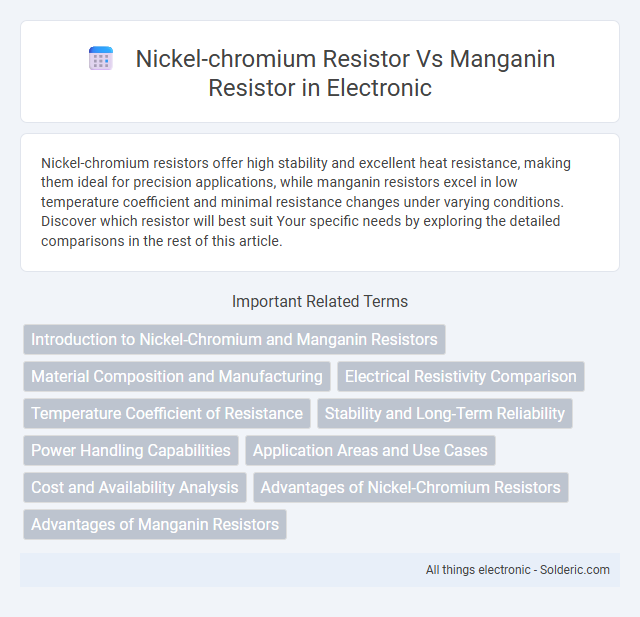Nickel-chromium resistors offer high stability and excellent heat resistance, making them ideal for precision applications, while manganin resistors excel in low temperature coefficient and minimal resistance changes under varying conditions. Discover which resistor will best suit Your specific needs by exploring the detailed comparisons in the rest of this article.
Comparison Table
| Feature | Nickel-Chromium Resistor | Manganin Resistor |
|---|---|---|
| Material Composition | Nickel (Ni) and Chromium (Cr) alloy | Manganin alloy (Copper, Manganese, Nickel) |
| Temperature Coefficient of Resistance (TCR) | Higher TCR (typically +40 to +60 ppm/degC) | Very low TCR (~+2 ppm/degC) |
| Stability | Moderate stability under temperature variation | Excellent stability and low drift |
| Resistivity | ~100 uO*cm | ~44 uO*cm |
| Applications | General-purpose resistors, heating elements | Precision resistors, standard resistors, strain gauges |
| Cost | Lower cost | Higher cost due to precision and stability |
Introduction to Nickel-Chromium and Manganin Resistors
Nickel-chromium resistors, known for their high resistivity and stability at elevated temperatures, are commonly used in precision heating elements and resistor applications requiring durability under stress. Manganin resistors, composed mainly of copper, manganese, and nickel, offer exceptional resistance stability and low temperature coefficients, making them ideal for precision measurement instruments and strain gauges. Both alloys deliver reliable performance, but nickel-chromium excels in high-temperature resilience while manganin provides superior resistance consistency in varying environmental conditions.
Material Composition and Manufacturing
Nickel-chromium resistors are composed primarily of a nickel and chromium alloy, providing high temperature stability and corrosion resistance, making them ideal for precision applications. Manganin resistors consist mainly of copper, manganese, and nickel, offering exceptional low temperature coefficient of resistance and excellent long-term stability due to their carefully controlled alloy composition. Understanding these material differences in manufacturing helps you select the right resistor type based on performance requirements such as thermal stability or resistance precision.
Electrical Resistivity Comparison
Nickel-chromium resistors typically have an electrical resistivity of around 1.10 x 10^-6 O*m, providing stable resistance over a wide temperature range, making them ideal for precision applications. Manganin resistors exhibit a higher resistivity near 4.4 x 10^-7 O*m and are valued for their extremely low temperature coefficient of resistance, which ensures minimal resistance change with temperature fluctuations. Your choice between these materials should consider the specific resistivity requirements and operating environment for optimal performance.
Temperature Coefficient of Resistance
Nickel-chromium resistors typically exhibit a higher Temperature Coefficient of Resistance (TCR) ranging from +300 to +400 ppm/degC, making them sensitive to temperature changes. Manganin resistors have a significantly lower TCR, usually around +-20 ppm/degC, providing superior stability and precision in varying thermal conditions. This low TCR makes manganin resistors ideal for precision measurements and applications requiring minimal resistance variation with temperature fluctuations.
Stability and Long-Term Reliability
Nickel-chromium resistors exhibit excellent stability and long-term reliability due to their high resistivity and resistance to oxidation, ensuring consistent performance in varying environmental conditions. Manganin resistors provide superior stability with minimal temperature coefficient of resistance, making them ideal for precision measurements and low-drift applications. Your choice depends on whether you prioritize oxidation resistance and high temperature performance (nickel-chromium) or ultra-low temperature drift and precision (manganin).
Power Handling Capabilities
Nickel-chromium resistors exhibit superior power handling capabilities due to their high melting point and excellent stability under thermal stress, making them ideal for high-power applications. Manganin resistors, while offering exceptional precision and low-temperature coefficient, typically handle lower power levels and are best suited for low-power, precision measurement environments. Your choice should consider the power demands of your circuit to ensure optimal performance and longevity.
Application Areas and Use Cases
Nickel-chromium resistors excel in high-temperature applications such as heating elements, aerospace instrumentation, and industrial machinery due to their stability and oxidation resistance. Manganin resistors are preferred in precision measurement devices, including standard resistors and shunts in ammeters, because of their low temperature coefficient and long-term stability. Both types serve critical roles in electrical engineering, with nickel-chromium favored for power dissipation and manganin for accurate current sensing.
Cost and Availability Analysis
Nickel-chromium resistors typically offer lower costs due to widespread production and abundant raw materials, making them more accessible for general applications. Manganin resistors, containing a copper-manganese-nickel alloy, are generally more expensive because of limited availability and specialized manufacturing processes. The higher cost and reduced availability of manganin resistors are offset by their superior stability and low temperature coefficient, often reserved for precision measurement instruments.
Advantages of Nickel-Chromium Resistors
Nickel-chromium resistors offer superior high-temperature stability and excellent corrosion resistance compared to manganin resistors, making them ideal for harsh environments. Their ability to maintain consistent resistance over a wide temperature range enhances measurement accuracy and reliability. You benefit from longer component life and reduced maintenance costs due to their robust mechanical strength and oxidation resistance.
Advantages of Manganin Resistors
Manganin resistors offer superior thermal stability and low temperature coefficient of resistance, making them ideal for precision measurement and instrumentation applications. They exhibit excellent long-term stability and minimal resistance drift under varying environmental conditions compared to nickel-chromium resistors. Their low thermal EMF and high corrosion resistance further enhance performance in sensitive electrical circuits.
nickel-chromium resistor vs manganin resistor Infographic

 solderic.com
solderic.com